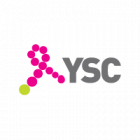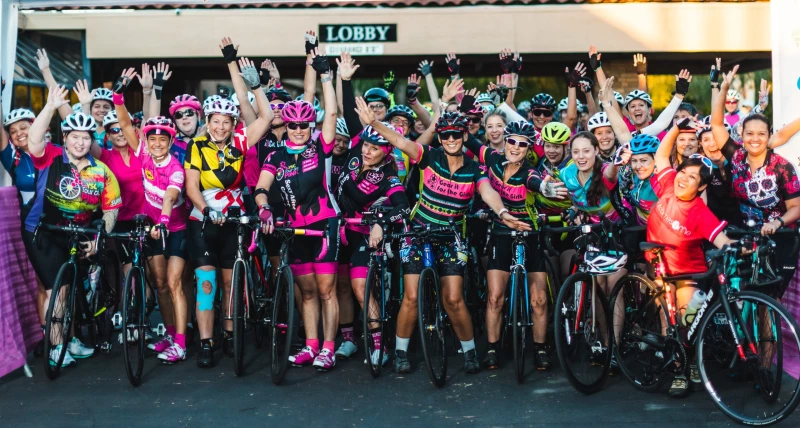Each spring, the American Association for Cancer Research holds their annual meeting, bringing together cancer researchers and oncologists from across the world to share and discuss the latest scientific discoveries. The AACR conference also convenes patient advocates, as part of the Scientist↔Survivor Program (SSP), a unique opportunity for survivors and patient advocates to connect face-to-face with the field’s top researchers. The SSP offers patient advocates the chance to attend the conference, communicate with scientists, engage in small-group discussions and more.
Medha Sutliff, FORCE's Director of Education and Research and a YSC RISE Legacy Advocate participated in the program this year, and we sat down to talk about her experience.

Emily Helck: One of the requirements of participating in the program is presenting an advocacy poster. What did you you present?
Medha Sutliff: It sounds daunting to create and exhibit a poster but truly the goal is simple: to educate conference attendees on an advocates’ survivorship and/or advocacy efforts. I displayed YSC’s RISE (Respected Influencers through Science and Education) poster which has been accepted for presentation at recent national and international breast cancer conferences. The poster details this ground-breaking program we created in 2015 to train the next generation of young breast cancer advocates. Now in its 2nd year, over 30 outstanding advocates are involved in RISE, receiving comprehensive trainings and focusing on advocacy initiatives across the country. It was amazing to be standing at my poster in this huge hall and share about YSC and RISE with researchers from around the world!
EH: What was your favorite part of the program?
MS: Oh boy, where do I begin! The opening session was incredible, over 22,000 people listening to former Vice President Joe Biden talk about Moonshot, and where we are with cancer research in this very interesting political time. And it was so cool to attend the AACR President’s Reception, and meet Plenary Session speaker Fran Drescher (AKA “The Nanny”) a vocal celebrity cancer advocate and founder of cancerschmancer.org.

But actually, the most valuable sessions were our Advocate Special Interest Sessions. We had a private meeting with the FDA, led by Richard Pazdur, Director of the Center for Excellence which leverages the combined skills of the FDA’s regulatory scientists and reviewers with expertise in drugs, biologics and devices to expedite the development of novel cancer products. We sat in a circle and got to ask questions about drug access and regulation. When does a patient ever get that opportunity? Incredible!
Other small group session highlights included Laura van 't Veer talking about genomics, Peter Kuhn on liquid biopsies, and Drew Pardoll sharing about immunotherapy. BIG names in cancer research. To be up close you realize these are real people doing incredible things in a lab or hospital every day, not just producing abstracts in a medical journal. As a patient advocate I was incredibly humbled and energized to see science in action, and particularly to hear these experts say they TRULY value an advocate role in directing research. They hear our voice and it ultimately has helped them save lives.
EH: One important component of the program is the ability for participants to share what they've learned with their communities. What will you bring back from this experience to YSC, and to your local community?
MS: I was encouraged to see several successful examples of government and private sector partnerships in cancer research, including sharing of Big Data through Project Genie, the Beau Biden Moonshot Initiative, and cancer genetics marrying cancer immunology.
I was also encouraged by the acceptance that we cannot be compartmentalized in cancer research anymore.
Another thing that really jumped out at me are the challenges young cancer patients face in accessing clinical trials. I was discouraged to learn that less than 5% of cancer patients elect to participate in a clinical trial. Are there novel ways we can help young women better navigate these challenges after their diagnosis ?
I’m excited to keep learning and share more with YSC’s constituents and our RISE advocates. They in turn can help disseminate information locally that will be useful to young women affected by breast cancer.

EH: Why do you feel it’s important for young women affected by breast cancer to take part in programs like Scientist↔Survivor?
MS: I think it’s so important for us to have a prominent “seat at the advocacy table”. The Scientist↔Survivor Program participants represent passionate and outgoing survivors and patient advocates from all cancers, not just breast. Young women affected by breast cancer need to be part of the big picture advocacy world.
Some of critical issues young women face in breast cancer, like fertility preservation, treatment options and access to care are also concerns in other YA cancers. Younger advocates definitely can seek out those posters, exhibits, sessions and researchers working to address these concerns. It’s one of the largest cancer conferences in the world and can be overwhelming at times to navigate but SSP also assigns each advocate a trained “Mentor” to help, stimulate discussion and answer any questions before, during and after the conference. It really gave me tremendous perspective and opportunity to hear about the latest findings in cancer research, foster collaborative interdisciplinary partnerships, and learn more about progress in new research in cancer health disparities.
EH: Would you encourage others to participate in this program?
MS: Yes! I would totally encourage a motivated advocate to apply to SSP! It’s unique in merging an international all-cancer conference with a focused advocate training program. Do your research though, as it’s a significant time commitment. One thing that helped me prior to applying was to talk to an advocate who has attended the program to get more of an idea of what it encompasses. Feel free to reach out to me anytime if you are interested! It’s an outstanding opportunity and well worth the time and effort.
For more information on AACR’s Scientist↔Survivor Program, including how to apply, click here. Find out more about how you can become an advocate for young women affected by breast cancer.




